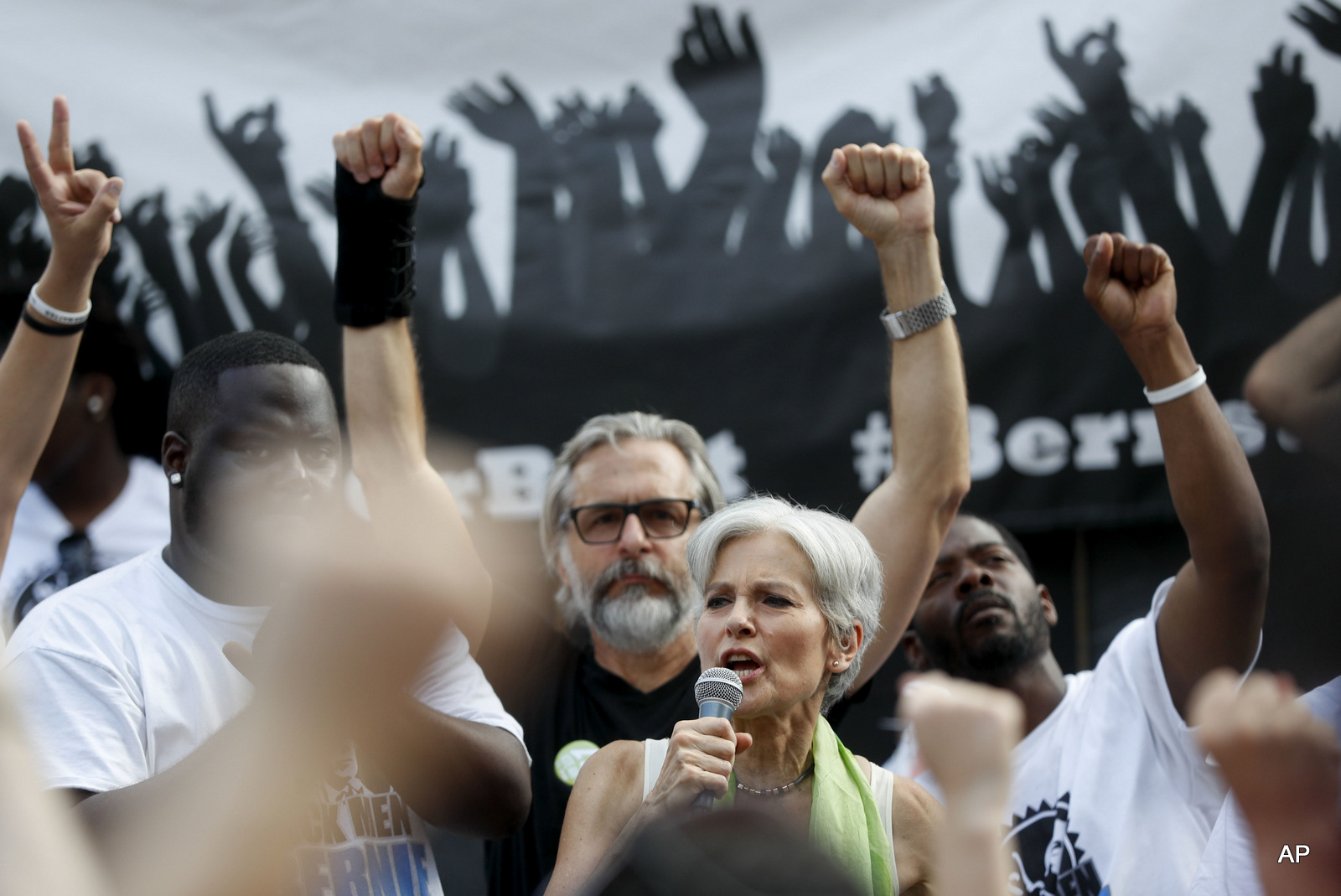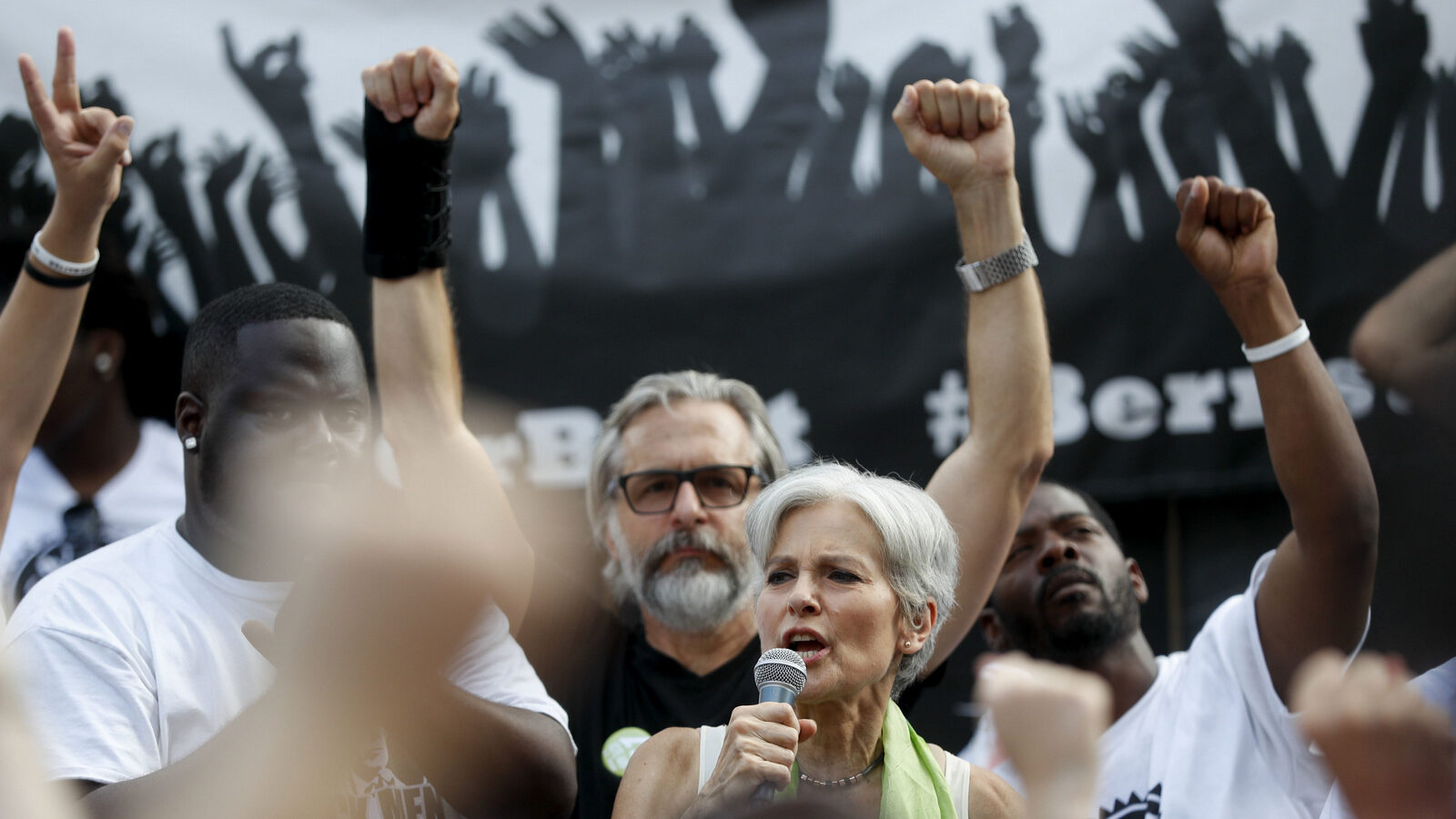
Published in partnership with Shadowproof.
W
hen Jill Stein ran as the Green Party’s presidential nominee in 2012, media attention to her candidacy was rare. Now, with two of the most unpopular presidential candidates in history, she has received widespread attention. There seems to be record interest in third party campaigns, including Libertarian Party candidate Gary Johnson.
The Nation published a debate between Socialist Seattle City Council member Kshama Sawant and Nation contributor Joshua Holland.
The editors gave Sawant’s column the negative headline—”Don’t Waste Your Vote On the Corporate Agenda—Vote for Jill Stein and the Greens”—but column does not hinge on loathing Donald Trump or Hillary Clinton. Rather, it makes a positive case for supporting Stein by primarily arguing the need for progressives to build an alternative to the two pro-capitalist political parties in America. It has a long-term focus on bringing about radical change.
Contrast the vision of Sawant’s column with Holland’s column, which is completely negative. It trashes the Greens and displays a brash contempt for democracy and those who are working to give voters more choices and more voices. It wholly ignores efforts for open primaries, open debates, and the need for reforms like ranked-choice voting or instant run-off voting, in order to have a system that has proportional representation and is more democratic.
The argument is representative of the discourse among many progressive commentators throughout previous elections, especially since Ralph Nader ran as a Green Party candidate in 2000. Instead of taking responsibility for how the Democrats failed to elect Al Gore and the role progressives perhaps played in selling out, Holland is a progressive who would rather scapegoat the Greens.
Hundreds of thousands of Democrats in Florida voted for George W. Bush. Tens of thousands of African American voters in Florida were disenfranchised. There were terrible issues with the butterfly ballot. Supreme Court Justice Antonin Scalia helped deliver the White House to Bush with a 5-4 decision that prevented a recount. Gore did not win his home state of Tennessee. Yet, these are facts progressive commentators like Holland would rather ignore because they force them to confront dismal realities that require intense struggle to change.
It is much easier to bear one’s insecurity with the presence of the Green Party in a two-party system that does everything it can to silence and erase their candidates when they run for office at all levels of government.
Holland relies on a fallacy that has become conventional wisdom among progressives—that the “Green Party’s primary pitch to voters on the left is that there still isn’t a dime’s worth of difference between the two major parties.”
A line Stein has repeated this cycle is the following, “There are differences between the two candidates and the parties. But those differences aren’t enough to save your job.” In other words, under a Democrat or a Republican, voters can expect corporate free trade deals that will offshore more jobs, privilege business interests, and ultimately lead to more poverty and hardship for the poor and working class.
Stein also told NPR in July, “I do not say there is no difference between the parties. What I say is that there’s not enough difference to save your job, to save your life, or to save the planet. And the scary things, the horrific things that Donald Trump says, Hillary Clinton has already done. Whether it’s massively deporting immigrants, whether it’s threatening nuclear warfare.”
In other words, Clinton was talking about deporting refugees from Central America in order to “send a message” before Bernie Sanders confronted her on this issue, and she was concerned it would cost her politically. She also once threatened to obliterate Iran if it attacked Israel, a blatant threat of nuclear annihilation.
“Put it this way: I will feel horrible if Donald Trump is elected, I will feel horrible if Hillary Clinton is elected, and I feel most horrible about a voting system that says: Here are two deadly choices, now pick your weapon of self-destruction,” Stein contended.
Holland denigrates progressives who would dare to support the Green Party by claiming the party “provides a forum to demonstrate ideological purity and contempt for ‘the system.’ But the Democratic Party is a center of real power in this country,” and it “offers a viable means of advancing progressive goals.”
It is far easier to bash those attempting to build something because they recognize doing the same thing over and over again while expecting a different result is the definition of insanity. The history of the Democratic Party is one of stamping down on candidates, like Sanders, when they attempt to change the party or absorbing uprisings, which is what seems to have happened with the Sanders campaign.
The Democratic Party has scarcely been transformed by the Sanders campaign. His plans for organizing progressives and running progressive candidates for political office are barely different from the plans of other groups that failed to seize control of the party during an election cycle.
So, what do Holland and other progressive commentators expect to happen when Clinton wins? Will they organize as if the Democrats are on their side and offer a “viable” option for creating change? Will they do the same thing they did after Barack Obama was elected and give her a chance but then, when it is time to act, hold tight because she is getting hammered by Republicans and does not need to be challenged by principled progressives?
Also, what do Holland and others propose progressives do when it comes time for Clinton to repay Republicans, who supported her candidacy and refused to support Trump? She is forming a coalition that will be highly influential when she is in the White House, and it will impact domestic policies important to progressives just as much as foreign policy and national security.
Finally, Holland contends in the opening of his column 75 to 90 percent of those claiming they will vote for Stein in November will not follow through. Why is that? Could it have something to do with progressives like Holland who actively harp and lecture any progressive, especially prominent ones, who would dare challenge the two-party system?
Why are the number of elected Green Party representatives in all levels of government shrinking? Holland argues it is dysfunction in the party, but the system is setup to ensure the party struggles and eventually dissipates.
While Holland says he has been to Green Party meetings and found them to be wildly disorganized and filled with mostly white people, this is mostly meaningless. He doesn’t share when he went to these meetings, and one has to wonder what Greens would say about Holland. Did he ever attempt to make any meaningful contribution at these meetings? Or did he sit in the back of the room and eavesdrop because he was afraid to stray too far from the path already blazed by countless progressive organizations, which are captives to the Democratic Party?
This is the problem with many progressive commentators like Holland. It is easy for them to suggest Green Party organizers are not doing what they should in between elections to grow the party, but it is not like they would help if the Green Party was doing a better job. They still cling to this notion that the Democratic Party grows more receptive to them each day. Meanwhile, their politics grow more accommodating of corporate power with each election.
Finally, isn’t it remarkable all the time progressives like Holland spend lecturing citizens on why they cannot vote their conscience? Especially when they believe Stein is unlikely to fare better than two or three percent in the polls?
Their insecurity translates into a fear that if Stein wins four or five percent of the vote or slightly better that will be bad for Clinton because she is running against Trump and not Stein. To them, Democrats should only have to worry about candidates that can win. It’s a winner-take-all system. Yet, to win and take it all, you still have to win votes. You aren’t owed the votes going to Stein, especially when you don’t campaign for those votes.
What if Stein wins five percent and Trump is elected president? It will be a failure of progressives.
Nader said on “Democracy Now!”: “It is the time for Senator Sanders to mobilize, as he can, all his supporters around the country with mass rallies to put the heat on both candidates. Is anything wrong with that? He should have a mass rally in the [National] Mall and then spread it all over the country, so you have civic pressure, citizen pressure, coming in on all the candidates to further the just pathways of our society. Why doesn’t he do that?”
Instead, what voters see most is a bunch of people like Holland fretting about Stein. This happens every election cycle, and not only are voters sick of the two-party system but they’re sick of those who use their platforms to attack dissent and push commentary to defend the status quo.
The views expressed in this article are the author’s own and do not necessarily reflect Mint Press News editorial policy.


